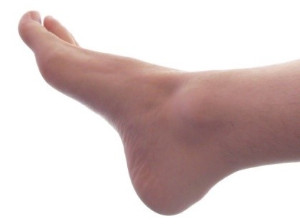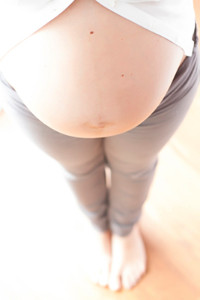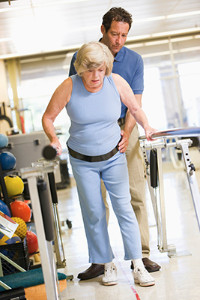
Lansdowne, PA
(610) 626-3338

Lansdowne, PA
(610) 626-3338
One of the bes t ways to avoid running injuries is to make sure you are wearing properly fitting shoes. There are three types of running shoes: stability/neutral, cushion, and motion control. Prior to starting your running program, it is crucial that you buy the right shoe type for the activity you are about to partake in. Shoes also have different components that serve different purposes. The part that is responsible for providing support is called the midsole. The midsole acts as a shock absorber, which protects your body from the dangers of repeated loading from running. The stiffer the midsole, the more control the shoe gives your foot. It is important that you try on the shoe you want before purchasing to ensure that it is great fit for you.
t ways to avoid running injuries is to make sure you are wearing properly fitting shoes. There are three types of running shoes: stability/neutral, cushion, and motion control. Prior to starting your running program, it is crucial that you buy the right shoe type for the activity you are about to partake in. Shoes also have different components that serve different purposes. The part that is responsible for providing support is called the midsole. The midsole acts as a shock absorber, which protects your body from the dangers of repeated loading from running. The stiffer the midsole, the more control the shoe gives your foot. It is important that you try on the shoe you want before purchasing to ensure that it is great fit for you.
If you are a runner, wearing the right running shoe is essential. For more information, contact Dr. George Yarnell from Pennsylvania. Our doctor can provide the care you need to keep you pain-free and on your feet.
Choosing the Right Running Shoe for Your Foot Type
To increase performance and avoid the risk of injury, it is important to choose the right running shoe based on your foot type. The general design of running shoes revolves around pronation, which is how the ankle rolls from outside to inside when the foot strikes the ground.
If you have any questions please feel free to contact our office located in Lansdowne, PA . We offer the newest diagnostic and treatment technologies for all your foot and ankle needs.
 Plantar warts are caused by the human papillomavirus (HPV). This virus thrives in warm, damp environments such as gym showers or other public facilities. In special cases, untreated plantar warts may develop into methicillin-resistant staphylococcus aureus (MRSA). Although sometimes plantar warts may go away on their own, if they are chronic or become painful you should consult with a podiatrist to go over treatment options.
Plantar warts are caused by the human papillomavirus (HPV). This virus thrives in warm, damp environments such as gym showers or other public facilities. In special cases, untreated plantar warts may develop into methicillin-resistant staphylococcus aureus (MRSA). Although sometimes plantar warts may go away on their own, if they are chronic or become painful you should consult with a podiatrist to go over treatment options.
Plantar warts can be very uncomfortable. If you need your feet checked, contact Dr. George Yarnell from Pennsylvania. Our doctor will assist you with all of your foot and ankle needs.
About Plantar Warts
Plantar warts are the result of HPV, or human papillomavirus, getting into open wounds on the feet. They are mostly found on the heels or balls of the feet.
While plantar warts are generally harmless, those experiencing excessive pain or those suffering from diabetes or a compromised immune system require immediate medical care. Plantar warts are easily diagnosed, usually through scraping off a bit of rough skin or by getting a biopsy.
Symptoms
Treatment
To help prevent developing plantar warts, avoid walking barefoot over abrasive surfaces that can cause cuts or wounds for HPV to get into. Avoiding direct contact with other warts, as well as not picking or rubbing existing warts, can help prevent the further spread of plantar warts. However, if you think you have developed plantar warts, speak to your podiatrist. He or she can diagnose the warts on your feet and recommend the appropriate treatment options.
If you have any questions please feel free to contact our office located in Lansdowne, PA . We offer the newest diagnostic and treatment technologies for all your foot and ankle needs.
Read more about All About Plantar Warts Arthritis and aching joints are one of the most prevalent complaints of people 55 years and over. Dr. Kendra Zuckerman of Main Line Health states, “arthritis technically means an inflammation of the joints.” Deborah Wolf, 76, shares her time between practicing law and playing tennis, and is not ready to slow down her rigorous schedule. However, after the development of arthritis in her knees, activity has become difficult. Dr. Zuckerman advises that exercise and weight-watching is important for arthritic patients, and that anti-inflammatory drugs can also help with the pain, too. Deborah works on knee strengthening and diet-planning to keep her pain at bay.
Arthritis and aching joints are one of the most prevalent complaints of people 55 years and over. Dr. Kendra Zuckerman of Main Line Health states, “arthritis technically means an inflammation of the joints.” Deborah Wolf, 76, shares her time between practicing law and playing tennis, and is not ready to slow down her rigorous schedule. However, after the development of arthritis in her knees, activity has become difficult. Dr. Zuckerman advises that exercise and weight-watching is important for arthritic patients, and that anti-inflammatory drugs can also help with the pain, too. Deborah works on knee strengthening and diet-planning to keep her pain at bay.
Proper foot care is something many older adults forget to consider. If you have any concerns about your feet and ankles, contact Dr. George Yarnell from Pennsylvania. Our doctor can provide the care you need to keep you pain-free and on your feet.
The Elderly and Their Feet
As we age we start to notice many changes in our body, but the elder population may not notice them right away. Medical conditions may prevent the elderly to take notice of their foot health right away. Poor vision is a lead contributor to not taking action for the elderly.
Common Conditions
Susceptible Infections
Diabetes and poor circulation can cause general loss of sensitivity over the years, turning a simple cut into a serious issue.
If you have any questions please feel free to contact our office located in Lansdowne, PA . We offer the newest diagnostic and treatment technologies for all your foot and ankle needs.
 Pregnancy can create additional pressure on the feet, making certain everyday activities and responsibilities difficult for women. Women who work desk jobs should ensure that they’re sitting in chairs that offer optimal support, while women who spend a majority of their time standing should occasionally elevate their feet using a foot rest. Wearing comfortable shoes is also a must and should never be overlooked. Elevating the feet can also help pregnant women in managing edema, as the feet often swell during pregnancy.
Pregnancy can create additional pressure on the feet, making certain everyday activities and responsibilities difficult for women. Women who work desk jobs should ensure that they’re sitting in chairs that offer optimal support, while women who spend a majority of their time standing should occasionally elevate their feet using a foot rest. Wearing comfortable shoes is also a must and should never be overlooked. Elevating the feet can also help pregnant women in managing edema, as the feet often swell during pregnancy.
Pregnant women with swollen feet can be treated with a variety of different methods that are readily available. For more information about other cures for swollen feet during pregnancy, consult with Dr. George Yarnell from Pennsylvania. Our doctor will attend to all of your foot and ankle needs.
What Foot Problems Can Arise During Pregnancy?
One problem that can occur is overpronation, which occurs when the arch of the foot flattens and tends to roll inward. This can cause pain and discomfort in your heels while you’re walking or even just standing up, trying to support your baby.
Another problem is edema, or swelling in the extremities. This often affects the feet during pregnancy but tends to occur in the later stages.
How Can I Keep My Feet Healthy During Pregnancy?
If you have any questions please feel free to contact our office located in Lansdowne, PA . We offer the newest diagnostic and treatment technologies for all your foot and ankle needs.
 Foot diseases and other foot-related problems often become more prevalent as we age. Years of bearing body weight and certain ailments can combine to wreak havoc on the feet and ankles. The foot problems we may experience as time goes on vary from minor to potentially very serious. First and foremost, if you are a diabetic, foot care needs to be a high priority. Diabetic ulcers and sores, if left untreated, can lead to infection and even gangrene, resulting in amputation. Daily foot inspections are necessary to ensure that there are no cuts, sores, or swelling. Even something as seemingly minor as cracked skin on the foot can lead to terrible consequences if gone unnoticed. Using moisturizer and soap that doesn’t dry out the skin can help in this area. That being said, it is also important to keep the feet dry, as toenail fungus grows more readily in moist environments. Keeping the feet elevated is also a good tip. This will help circulate the blood to the lower extremities. Poor circulation can lead to serious medical conditions.
Foot diseases and other foot-related problems often become more prevalent as we age. Years of bearing body weight and certain ailments can combine to wreak havoc on the feet and ankles. The foot problems we may experience as time goes on vary from minor to potentially very serious. First and foremost, if you are a diabetic, foot care needs to be a high priority. Diabetic ulcers and sores, if left untreated, can lead to infection and even gangrene, resulting in amputation. Daily foot inspections are necessary to ensure that there are no cuts, sores, or swelling. Even something as seemingly minor as cracked skin on the foot can lead to terrible consequences if gone unnoticed. Using moisturizer and soap that doesn’t dry out the skin can help in this area. That being said, it is also important to keep the feet dry, as toenail fungus grows more readily in moist environments. Keeping the feet elevated is also a good tip. This will help circulate the blood to the lower extremities. Poor circulation can lead to serious medical conditions.
If you need your feet checked, contact Dr. George Yarnell of Pennsylvania. Our doctor will attend to all of your foot and ankle needs and provide you with quality treatment.
Geriatrics and Podiatry
When people age, some common issues that may occur are bone density loss, dry skin, poor circulation, and rough brittle nails. These issues may also affect your foot health if the necessary steps are not taken to alleviate the problems.
It is important to take care of your feet because feet that are injured or diseased can affect your overall health. Having painful feet hinders your ability to do daily activities or may decrease your willingness to do the things that you need to do.
Visiting Your Geriatrician
As we age, health problems become more likely, so it is essential to visit your doctor for check-ups to ensure that you are doing the best you can to take care of your health. It is recommended to check your feet frequently for any possible cuts, bruises, swelling, corns or any other irregularities.
Taking Care of Elderly Feet
Cracked or dry feet can be treated by applying moisturizer often. It is also important not to wear old socks because the older the sock is, the higher the possibility there will be that there is bacteria there. Wear fresh socks and make sure they fit properly.
Proper foot health means that you can have a more active lifestyle and you will not be bogged down by pain. Foot health also leads to good circulation, which is paramount for overall health.
If you have any questions, please feel free to contact our office located in Lansdowne, PA . We offer the newest diagnostic tools and technology to treat your foot and ankle needs.